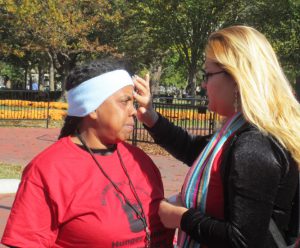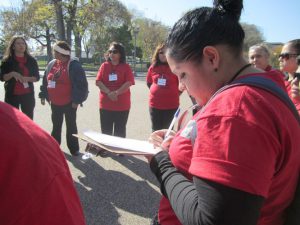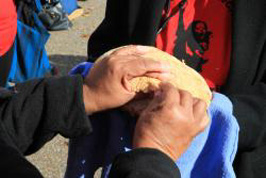Texas group holds hunger strike, demanding economic development along border

WASHINGTON
— Ana de Jesus Arreola came to the nation’s capital from El Paso knowing she was only going to drink liquids for at least 10 days.
Arreola is one of 12 women from La Mujer Obrera who participated in a 10-day hunger strike in front of the White House. Through the strike, the El Paso women’s group wanted to raise awareness for a border development commission. To prepare for the hunger strike, Arreola told herself it was all mental. “La Mujer Obrera” means the woman worker.
“I told myself I’m not going to eat — I’m going to drink water. I’m going to relax to last however long I need to last,” she said in Spanish.
A Southwest Border Regional Commission was authorized under the 2008 Farm Act. But the commission has not received funding and has not been created, according to the office of Rep. Silvestre Reyes, D-Texas.
Wearing red shirts that said “Women in the struggle” in Spanish, La Mujer Obrera members gathered in a circle Nov. 8 in front of the White House for a ceremony to begin the hunger strike.
The women said in Spanish why they were participating during the opening ceremony. Afterward, anointing oil was put on each of the women’s foreheads.

“Long live the women workers,” they cheered in Spanish.
During the fast, La Mujer Obrera had daily programs focusing on topics such as women’s issues, Latino heritage and public policies. They broke the strike Nov. 17 with a ceremony.
The group has been around for 29 years. La Mujer Obrera’s main goals are empowerment for women, economic development and community development. Although the government has made efforts to create jobs, the group said those efforts have not been aimed at women.
Orozco said the group has created jobs for women through community initiatives including the Mercado Mayapan (a market), a day care center and cafe.
But the group said it needs more resources and support to continue its efforts to create a stable economy along the border.
“We don’t want to be factory workers that are used,” said Rubi Orozco from La Mujer Obrera. “We want to create a lasting economy.”
The 2008 median household income in El Paso was $36,519, lower than the U.S. median of $50,049, according to the U.S. Census Bureau. A fourth of the population lives below the poverty level.
Orozco said a border development commission could create long-term economic growth.
Arreola joined La Mujer Obrera 10 years ago after losing her factory job. She said the group taught her about workers’ right. She became involved in projects such as the day care center to create employment for women.

“We are demonstrating that we serve for this purpose – to give a future to the youth, to leave them future employment,” she said in Spanish.
The office of the El Paso Mayor John Cook said it was unaware of the hunger strike and had no comment.
The group sent letters to six government agencies asking to set up meetings about creating the commission. The women met with representatives from the U.S. Department of Agriculture.
Reyes sent a letter to President Barack Obama on Nov. 19 asking to include funding for the Southwest Border Regional Commission in the 2012 budget.
After driving from Washington, the women arrived in El Paso on Sunday to a crowd of family and friends. The women were proud of going through the strike, Orozco said.
Based on the meetings La Mujer Obrera had with the USDA, Orozco said federal officials should be visiting the area soon.
Orozco said La Mujer Obrera will continue to push for resources along the border area.
“Now they are talking about poverty and economic development and that is really important to us,” she said. “We are visible to them.”






